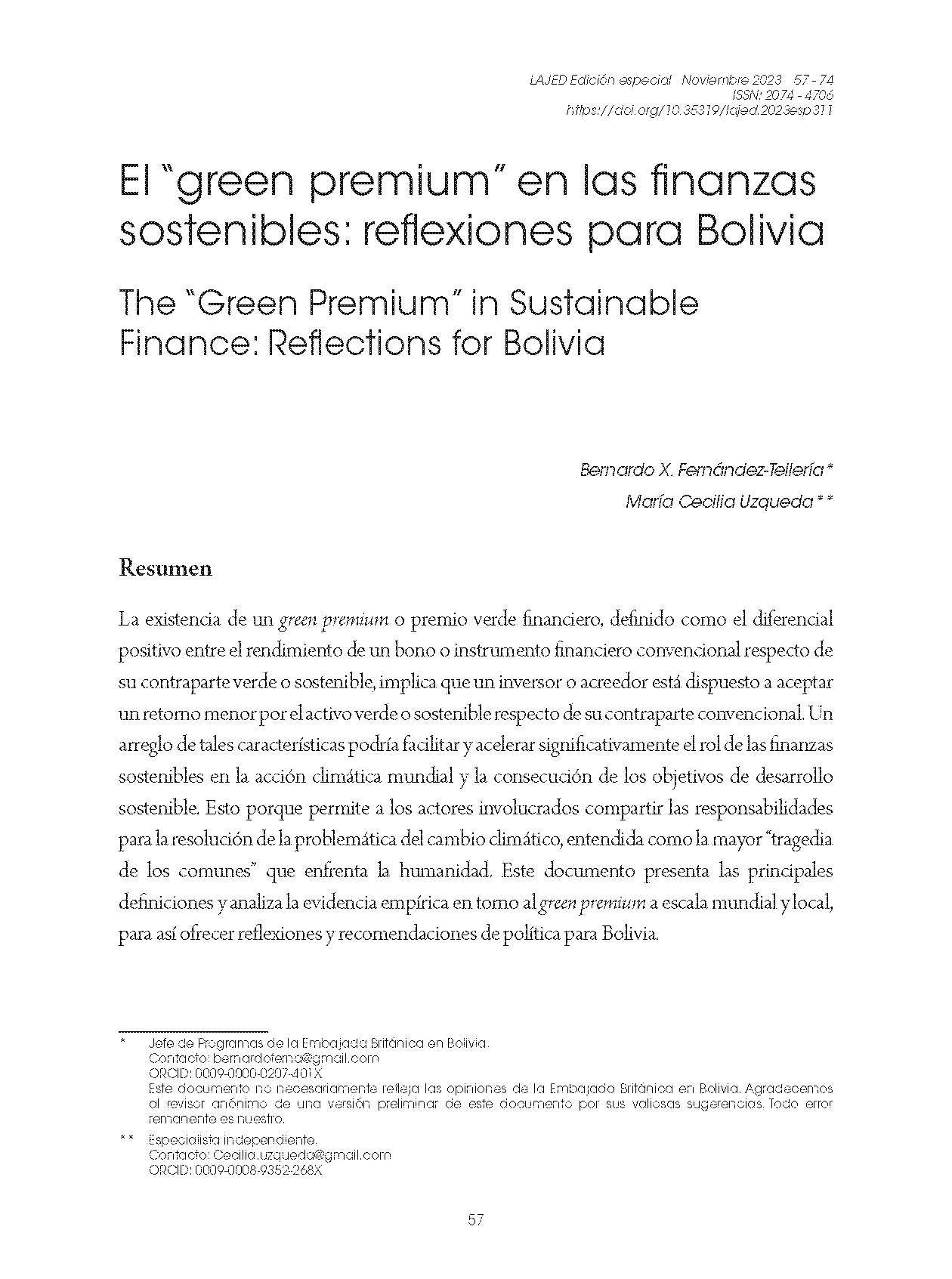The “Green Premium” in Sustainable Finance: Reflections for Bolivia
DOI:
https://doi.org/10.35319/lajed.2023esp311Keywords:
Sustainable finance, tragedy of the commons, green premium, Climate Change, BoliviaAbstract
The existence of a green financial premium, defined as the positive spread between the yield of a conventional bond or financial instrument relative to its green or sustainable counterpart, implies that an investor or creditor is willing to accept a lower return for the green or sustainable asset relative to its conventional equivalent. Such an arrangement could significantly facilitate and accelerate the role of sustainable finance in global climate action and the achievement of the Sustainable Development Goals. This is because it allows the actors involved to share responsibilities for solving the problem of climate change, understood as the greatest “tragedy of the commons” faced by humanity. This document presents the main definitions and analyzes the empirical evidence on the green premium at the global and local scale, to offer reflections and policy recommendations for Bolivia.
Downloads
References
Archer, M. (2022). The Ethics of ESG. Sustainable finance and the emergence of the market as an ethical subject. Journal of Global and Historical Anthropology. 22, 93. https://doi.org/10.3167/fcl.2022.930102
Baker, M., Bergstresser, D. Serafeim, G. y Wurgler, J. (2018). Financing the Response to Climate Change: The Pricing and Ownership of U.S. Green Bonds. http://dx.doi.org/10.2139/ssrn.3275327
Bernow, S., Klempner, B. y Magnin, C. (2017). From ‘why’ to ‘why not’: Sustainable investing as the new normal. McKinsey & Company. https://www.mckinsey.com/industries/private-equity-and-principal-investors/our-insights/from-why-to-why-not-sustainable-investing-as-the-new-normal
Bauer, M. Huber, D., Rudebusch, G. D. y Wilms, O. (2023). Where is the Carbon Premium? Global Performance of Green and Brown Stocks CESifo, Working Paper N° 10246. https://www.brookings.edu/research/where-is-the-carbon-premium-global-performance-of-green-andbrown-stocks/
Bhattacharya, A., Dooley, M. Kharas, H. y Taylor, C. (2022). Financing a Big Investment Push in Emerging Markets and Developing Countries for Sustainable, Resilient and Inclusive Recovery and Growth. Grantham Research Institute at LSE. Brookings Institution.
Carney, M. (2015). Breaking the tragedy of the horizon - climate change and financial stability.Lloyd’s of London Speech. Bank of England. https://www.bankofengland.co.uk/speech/2015/breaking-the-tragedy-of-the-horizon-climate-change-and-financial-stability
Druzin, B. (2016). The Parched Earth of Cooperation: How to Solve the Tragedy of the Commons, En International Environmental Governance. Duke Journal of Comparative & International Law. 27 (73), 73-105.
Fendt, L. (2021). Why did the IPCC choose 2°C as the goal for limiting global warming? Climate Portal MIT. https://climate.mit.edu/ask-mit/why-did-ipcc-choose-2deg-c-goal-limiting-global-warming
Georgieva, K., Gaspar, V. y Pazarbasioglu, C. (2022). Poor and Vulnerable Countries Need Support to Adapt to Climate Change. IMF Blog, Development. https://www.imf.org/en/Blogs/Articles/2022/03/23/blog032322-poor-and-vulnerable-countris-need-support-to-adapt-to-climate-change
Gianfrate, G. y Peri, M. (2019). The green advantage: Exploring the convenience of issuing green bonds. Journal of Cleaner Production, 219(10), 127-135. https://doi.org/10.1016/j.jclepro.2019.02.022.
Grzegorczyk, M. y Wolff, G. (2022). Greeniums in sovereign bond markets. Paper 17/2022, Bruegel.
Hardin, G. (1968). The Tragedy of the Commons: The population problem has no technical solution; it requires a fundamental extension in morality. Science, 162(3859), 1243-1248. Doi:10.1126/science.162.3859.1243
Kapraun, J., Carmelo, L., Scheins, C. y Schlag, C. (2021). (In)-Credibly Green: Which Bonds Trade at a Green Bond Premium? Proceedings of Paris December 2019 Finance Meeting EUROFIDAI -ESSEC. http://dx.doi.org/10.2139/ssrn.3347337
MacAskill, S., Roca, E., Liu, B., Stewart, R.A. y Sahin, O. (2021). Is there a green premium in the green bond market? Systematic literature review revealing premium determinants. Journal of Cleaner Production, 280(1).
Singh, M. y Patel, K. (2023). Keys to Climate Action. Financing Climate Change Mitigation and Adaptation in Developing Countries. Brookings Institution. Working Paper 180.12. https://www.brookings.edu/wpcontent/uploads/2023/02/Chapter-12.-Financing-climate-change-mitigation-and-adaptation-in-developing-countries.pdf
Schoenmaker, D. y Schramade, W. (2019). Principles of Sustainable Finance. Oxford University Press.
The City UK (2022). Green finance: A quantitative assessment of market trends. https://www.thecityuk.com/media/021n0hno/green-finance-a-quantitative-assessment-of-market-trends.pdf
Tso, K. (2021). How are countries held accountable under the Paris Agreement? MIT Climate Portal. https://climate.mit.edu/ask-mit/how-are-countries-held-accountable-under-paris-agreement
UNCTAD (2014). World Investment Report 2014. Naciones Unidas. https://unctad.org/system/files/official-document/wir2014_en.pdf

Downloads
Published
How to Cite
Issue
Section
License
Copyright (c) 2004 Revista Ciencia y Cultura

This work is licensed under a Creative Commons Attribution-NonCommercial 4.0 International License.





